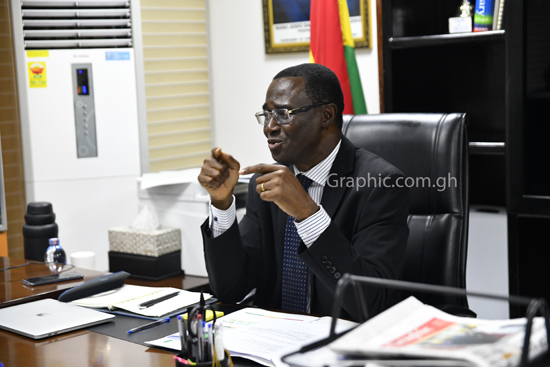The new property rate collection platform, Myassembly.gov.gh, has accrued over GH¢20 million in three months of operation.
The amount was paid through voluntary compliance within the 52-day moratorium provided under the Local Governance Act, 2016 (Act 936).
Up to 70 per cent of the amount has since been transferred into the accounts of the relevant metropolitan, municipal and district assemblies (MMDAs) where the properties are located, with the remainder disbursed as the cost of collection.
With the moratorium already elapsed, the Ghana Revenue Authority (GRA), assisted by the MMDAs, says it will intensify nationwide enforcement as part of measures to ensure compliance with property rate payments.
It said further measures would include “highly visible prosecution of recalcitrant defaulters” in order to showcase the consequences of non-compliance of the law.
“The new property rate regime, which came to life in April this year, is expected to boost revenue mobilisation efforts of the MMDAs and the country in general,” the Head of Communications of the GRA Property Rate Project Office, Ernest Adade, said in an interview with the Daily Graphic in Accra.
“Within two months, the system was able to generate GH¢10 million, and we were able to cross GH¢20 million in August; all of these are mainly voluntary payments under the moratorium or grace period,” he explained.
Hitherto, the assemblies on their own were collecting an average of GH¢56 million per year across the country.
Prosecution
Mr Adade stated that the process reached collection and enforcement in September, with people being urged to log on to the platform or portal to access their rate and pay.
He said Act 936 mandated relevant authorities to auction properties in question to deflate property rate arrears.
“The law clearly demands that a property should be auctioned if its rate is not paid.
The property rate is not on the owner but on the property, and for that reason the owner is paying for owning the property.
“The Act never prescribed an arrest of the owner; rather, it called for an auction of the property, the amount owed retrieved, and to return the rest to the owner,” he said.
![]()
Misunderstanding
Some assemblies have reported passed resolutions over supposed low inflows from property rate since the introduction of the new regime, but Mr Adade said such actions were the result of “clear misunderstanding” on the part of the local authorities concerning the unified common platform.
He said the project was designed to address challenges faced by the local authorities in the administration of property rates in the country.
He said it was to solve the difficulty of finding end-to-end solutions separately for the collection of the revenue to enhance the internally generated funds (IGF) of the MMDAs.
However, he said, the solution had already been provided freely in the unified common property rate platform for all the MMDAs by the revenue collection agency.
Mr Adade said information technology equipment or smart devices such as tablets and phones, as well as data to run the devices, had been provided under the project for free to enable access to the portal.
As a result, he said, over 2,250 personnel, who previously served as property rate collection officials of the MMDAs, had been supported with smart devices to assist the public to log on and pay their due.
“We have also provided them with technical support officers in all the 261 districts in the country.
The job of these officers is to help to build capacities of MMDAs on how to mobilise revenue.
“They are supposed to educate the assembly members and the public in general on the new property rate regime,” he said.
TSOs
The communication head stated that the technical support officers (TSOs) were expected to train local authorities and the general public by prioritising markets, institutions, churches, and mosques as key collection points due to their high concentration of people and property owners.
He challenged the MMDAs and assembly members to leverage the tools and the support secured to mobilise more revenue from property rate.
“We think the assemblies did not understand the entire project because we have given them everything so that they can educate people to help increase compliance.
“Property rate is now being paid directly into Myassembly.gov.gh and then transferred into the account of the MMDAs,” Mr Adade added.
Background
The government in the 2022 Budget indicated an intention to implement a common platform for property rate administration to enhance property rate collection and its accountability.
It subsequently tasked the GRA to assist MMDAs to administer the property rate with an introduction of a unified common platform which took off in April this year.
This was after details of all the billable properties and their associates across the country had been identified and codified into the unified common platform.
So far, over 10.12 million properties and 15.3 million associates have been identified for the purpose of property rate collection in Ghana.


